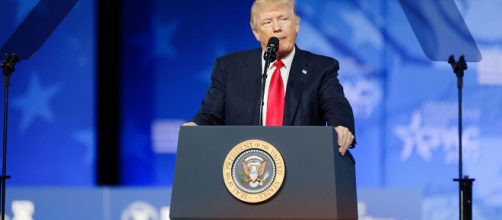According to a news report in the Washington Post, Donald Trump is poised to formalize the introduction of steel and aluminum tariffs. However, White House officials announced that the initial plan would see Canada and Mexico exempt from the tariffs. The president is expected to hold a formal signing ceremony on Thursday. This is despite intense requests from more and 100 Republican lawmakers to reconsider his position on the introduction of tough tariffs.
Republicans divided on tariff introduction
Washington Post sources also revealed that 107 Republicans voiced their concerns in a letter to the president, urging him to steer away from the introduction of broad tariffs.
Instead, they suggested taking focused action on unfair trading partners such as China. This letter follows Gary Cohn's resignation early this week, which many believe was sparked by his opposition to the introduction of a 10 percent tariff and aluminum and 25 percent on steel.
Nonetheless, Trump enjoys support from close Republican allies such as Peter Navarro. Considered a trade skeptic and once sidelined by Cohn, Navarro is now a strong supporter of Trump's tariffs.
Peter Navarro: "We're gonna have 25% tariffs on steel, 10% on aluminum...Canada and Mexico are going to be given an opportunity to negotiate a fair trade deal for NAFTA... If we get that, they won't receive the tariffs...Tomorrow, bottom line, is gonna be a good day for America." pic.twitter.com/N0EC1OHikW
— FOX Business (@FoxBusiness) March 7, 2018
In contrast, Republican, Ben Sasses is one of those urging the president to rethink his strategy.
But the president is unlikely to be swayed and looks set to forge ahead.
Exemptions for Mexico and Canada
While Mexico and Canada will be excluded, President Trump had initially stressed that the tariffs would apply across the board. Speaking to industry executives, he had said that excluding one country would lead to other countries looking for similar special treatment. Nevertheless, Mexico and Canada won't now be hit with the tariffs.
International reaction to tariff introduction
Following Trump's tariffs announcement, governments from across the globe have been urging a rethink. Fears of an international trade war have emerged, with many countries stating that they would retaliate if necessary.
At a news conference in Bejing, China's foreign minister said that choosing a trade war was a mistake and would only hurt all parties involved.
The European Union questioned the legislative basis for the tariff introduction, while also announcing retaliatory measures.
Steel prices have already risen in the US
According to the Federal Reserve, steel prices have already risen in many regions. This price increase has already affected companies further down the supply chain. Food packaging companies, for instance, have already had to pay more for the steel they require. This highlights that the introduction of tariffs will impact right across the economy.


